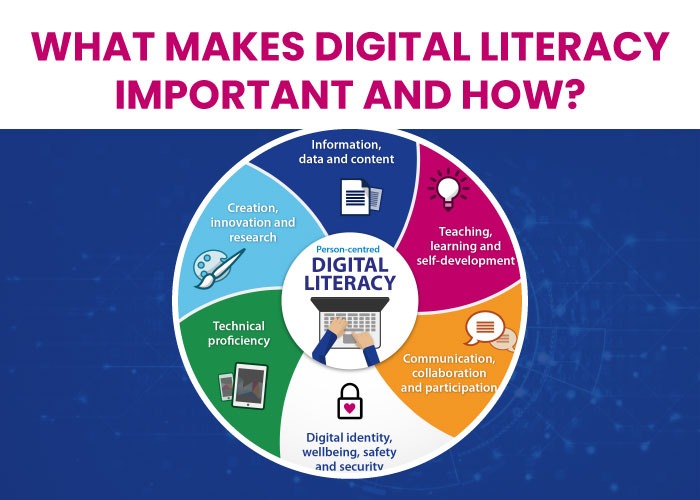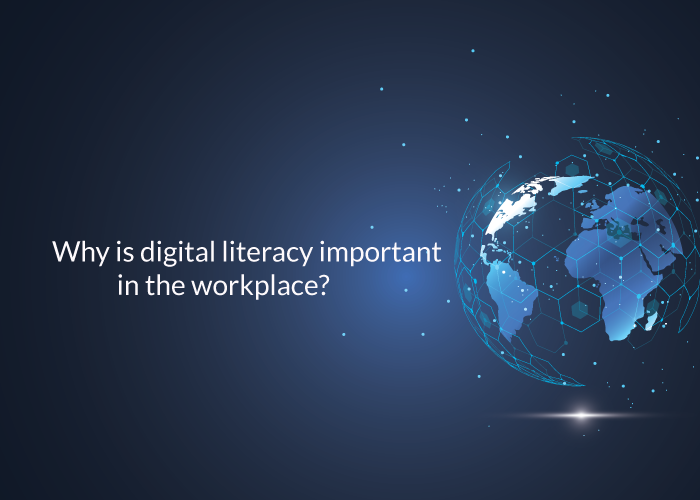Given how quickly the digital world is changing nowadays, digital literacy is becoming essential for success in the job. Employees and businesses alike must be able to use digital tools and platforms efficiently as technology continues to permeate every part of our lives. This essay will examine the value of digital literacy in the workplace and how it helps people stay competitive and accomplish their career objectives. “Why is digital literacy important in the workplace” is a burning topic now a days.
Digital Literacy: What Is It?
The ability to comprehend and use technology to carry out daily tasks is known as digital literacy.
What Does Digital Workplace Literacy Mean?
The ability, awareness, and mindset of people to confidently solve problems, be productive, support well-being, and thrive at work through the processing and application of information and data, content creation, and client and peer connections through the responsible and effective use of digital workplace tools is known as digital literacy in the workplace.
Additionally, digital literacy is crucial since it can:
Boost productivity and efficiency
Enable process optimization based on actual facts and assist in comprehending the larger picture and the role that each role plays.
Allow you to explain complex ideas in a clear and understandable manner.
It’s crucial to start with the fundamentals as developing digital literacy takes time.
Do technical skill and digital literacy differ from one another?
Digital literacy is a soft talent that may be applied in a variety of contexts and tailored to different levels of digital competency, even if it can entail technical abilities like coding or data analytics.
What Makes Digital Literacy Important and How?

Digital literacy teaches staff members and companies how to improve teamwork for outcomes.
A significant first step toward better documentation for a company and its staff is digital literacy.
Employees and a firm will face fewer issues with digital literacy.
Digital literacy forces the company and its workers to engage more with the outside world.
A firm, a company, and its workers start working promptly and intelligently.
A firm, its workers, and the company itself will be able to handle services to the delight of its clients.
Businesses that possess digital literacy are more adaptable and resilient to change.
Enhanced Interaction and Cooperation:
Thanks to a range of digital tools including email, instant messaging, and video conferencing, employees with digital literacy are able to interact and collaborate more efficiently.
Increased Efficiency and Productivity
Employees that are proficient with digital tools and software can finish work faster and spend less time on manual operations. Businesses can save money because to this higher productivity, which also frees up workers to concentrate on more important work, which promotes innovation and expansion.
Information and Resource Access
Employees with digital literacy are better able to swiftly obtain and evaluate information, improving their knowledge and decision-making agility. In today’s fast-paced, data-driven corporate world, where being current with industry trends and changes is critical to staying ahead of the competition, this skill to efficiently conduct research and acquire data is essential.
Increased Flexibility and Sturdiness
Digital literacy makes it easier for staff members to adjust to new tools, systems, and procedures as technology advances. This flexibility is crucial in a workplace that is always evolving, where workers need to be ready to pick up new skills and adopt new technology in order to stay competitive.
Professional Advancement and Career Development
The ability to use digital media is growing more and more in-demand across a range of sectors, making it a crucial part of career advancement. Workers with digital literacy are more likely to grow in their professions because they know how to function in the modern workplace and make a positive impact on the company.
Stay current with emerging trends
Employing a flexible and technologically savvy staff will free you from having to keep up with emerging technology and enable you to lead the way in terms of emerging trends.
Cutting expenses
Your costs will decrease due to higher productivity and less stress on your IT department. In fact, if you used to outsource IT, you might be able to handle things internally.
Awareness of cyber security
Promoting digital literacy encourages businesses to make more informed decisions about potential digital hazards in online settings. In light of high-profile data breaches like the 2020 Twitter incident, which revealed well-known individuals to have been unwittingly complicit in a bit coin scam, it is imperative that companies have the technical know-how to safeguard themselves against cyber-attacks.
Digital Fluency is most important for workplace-
Digital fluency refers to the ability to use digital tools and systems successfully, efficiently, and confidently. It includes a broad variety of abilities and talents that enable people to use technology to navigate and further their objectives.
The Increasing Requirement for Adaptability and Digital Fluency:
Employees need to be flexible and rapid learners of new platforms and technologies as technology advances. This calls for a solid foundation in digital fluency as well as a readiness to pick up new skills and try them out. Digital fluency is now a must for success in many occupations rather than just a “nice-to-have” ability.
Research: Employees must be able to perform internet research in order to stay current on advancements and trends in the business.
Do they ask you too?

Utilising digital literacy.
You sound better when you speak.
You can now listen better.
Your education has improved.
You’ve written better now.
Even for specific people and the entire company.
Conclusion:
Because of the widespread use of technology, digital literacy is more crucial than ever. Virtually everyone in the world uses technology. The use of technology is no longer restricted to a select group of well-educated, upper-class individuals. Digital literacy is always in short supply, whether it be in the workplace, at home, in the marketplace, or somewhere else.

